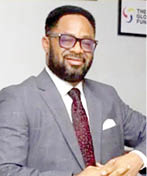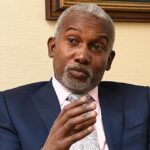In this interview with Weekend Trust, the Country Director of ActionAid Nigeria (AAN), Mr Andrew Mamedu, spoke on what Nigeria can do to protect children.
What do you say about the arrest and detention of the minors over the August #EndBadGovernance protest in parts of the country?
ActionAid Nigeria strongly condemns the unlawful detention and mistreatment of peaceful protesters, particularly the minors, by security forces during the #EndBadGovernance protest in August 2024. The detention and subsequent humiliation of these young individuals represent a clear violation of the Child Rights Act, which safeguards children from harm, abuse and neglect.
Under the Nigerian constitution, children should not be treated as adults in matters of law enforcement, especially when there is no concrete evidence to suggest their involvement in any serious crime, such as treason. This action by Nigerian security agencies not only undermine the rights and dignity of peaceful protesters, but also flagrantly disregards the protection and respect owed to minors and children.
It is deeply concerning that, in this instance, the basic human rights of children were compromised, reflecting a broader failure to uphold the dignity and rights of all citizens, particularly the most vulnerable.
What do you think of the president’s directive to release the boys?
It is hard to commend the president for taking the action that secured the release of the minors.
Just as it took four days of protests in August for President Tinubu to respond to the #EndBadGovernance movement despite citizens loudly voicing their demands, it is disappointing that his response to the detention of the minors from these protests was similarly slow. It wasn’t until there was a strong outcry from citizens, civil society organisations and lawyers that the president took the necessary action to release the detained minors.
These minors were detained for over two months, which raises serious questions about why the government did not intervene sooner. The executive had the opportunity to release them much earlier but chose not to act until public pressure became overwhelming.
While ActionAid Nigeria is relieved that the president has now directed the formation of an administrative committee led by the minister of humanitarian affairs to investigate the arrest, detention and treatment of the minors, we are mindful that this response was far too slow.
We can only hope that the investigation would bring the justice these young children deserve, and that this unfortunate situation would serve as a reminder of the need to protect the rights and dignity of all citizens, especially the most vulnerable.
How can the country avoid a recurrence?
Although participating in the #EndBadGovernance in itself did not provide a lawful ground for arresting and detaining children, the fact remains that these minors were wrongfully detained for exercising their fundamental rights. The wrongful detention of these children, whose only ‘crime’ was participating in peaceful demonstrations, reflects a grave violation of both the Nigerian law and international human rights standards. To avoid such a situation in the future, the government must take concrete actions to ensure the protection of children and prevent the misuse of legal powers.
There is an urgent need to enforce legal protection for children more effectively. The Child Rights Act, which is meant to safeguard children from harm, must be strictly adhered to, with severe penalties for those who violate its provisions. This includes ensuring that minors are never detained in adult facilities or subjected to abusive treatments.
Law enforcement agencies must be made aware that minors are afforded special protection under the Nigerian law and any arrest or detention involving children should follow a strict set of procedures that prioritise their welfare. This would include making sure that detention is used only as a last resort and never for the mere act of peaceful protest.
Secondly, there must be a clear set of protocols for law enforcement agents when dealing with minors. Security personnel need regular training to understand the legal distinction between minors and adults, particularly in protest situations.
They should be equipped with non-coercive methods for managing situations involving young people. Any detention must be brief, with appropriate alternative solutions, such as the presence of a guardian or family member prioritised. By improving these protocols, we can ensure that children are treated with the dignity and respect they deserve, even in tensed public demonstrations.
Thirdly, accountability is crucial. There must be clear and transparent systems in place to investigate and punish any wrongful actions by law enforcement agents.
How can Nigeria make her youths productive?
To make the Nigerian youth more productive, we must collectively focus on creating an environment that nurtures their potentials, harnesses their energy and provides the opportunities they need to thrive.
Nigeria has one of the largest youth populations in Africa, with over 60 per cent under the age of 25. This demographic represents a tremendous opportunity for national growth but also poses a significant challenge given the rising levels of unemployment, poverty and social unrest.
In order to transform this demographic potential into a productive force, Nigeria must address the root causes of youth disenfranchisement, which are deeply tied to the systemic corruption and bad governance that have long plagued the country.
The Nigerian youth are often left without the tools they need to succeed, while the promises of prosperity remain unfulfilled due to ineffective governance and the misallocation of national resources.
Investing in education, skills development, job creation and mental wellbeing can only succeed if these systemic barriers are addressed.

 Join Daily Trust WhatsApp Community For Quick Access To News and Happenings Around You.
Join Daily Trust WhatsApp Community For Quick Access To News and Happenings Around You.


